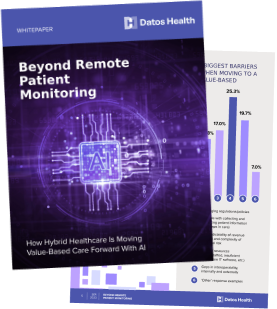Next Gen Hybrid Care Hinges on AI and Automation
To reduce physician and clinician workloads to address staff shortages, and finally recognize patients as consumers and meet their needs, a new paradigm for hybrid healthcare is required. This new model must take into account AI (artificial intelligence) and automation and consider how they can play a pivotal role in enabling efficient clinical workflows and add a level of personalization that was previously unattainable for both patients and clinicians.
Advanced platforms that enable hybrid care can take raw data and turn it into clinical utility in a non-cumbersome way for clinicians, helping them to make better decisions while leveraging AI in healthcare. Hybrid models can reduce administrative burden, increase clinical capacity, and allow physicians to practice at the top of their licenses. With real-time data monitoring, vitals measurements, and survey responses, next-generation hybrid care models can replicate many in-person care experiences in a virtual setting to enable earlier intervention, improved quality of care, and personalization.
Main Benefits of Hybrid Care Models
Unlike in-person care alone, which only provides a snapshot of an individual’s health, next-generation hybrid care combines in-person and virtual care while digitizing the entire journey, allowing for a holistic, continuous view throughout the care continuum.
This new model reduces care team workload and puts automation to work for them by guiding patients through assisted self-care with interactive care apps and providing them with education about their conditions—a unique combination that drives engagement and program adherence and results in better outcomes. Patients get immediate and accurate responses to outcome-critical day-to-day care issues like symptom and side effect management, enabling providers to remotely titrate medications, prescribe different exercise routines, and prevent avoidable hospital readmissions.
More importantly, effective hybrid care enables early intervention, alerting providers to potential issues before they escalate into crises. Providers are able to treat larger patient populations, while still offering a patient-centric and personalized approach to remote care—a key factor in the success of RPM intervention in reducing acute care use.
Key takeaways:
- Learn how AI-driven platforms improve patient experience with curated content and timely responses to health-related questions
- Determine how to put automation to work for you to reduce workload while still delivering the right care at the right time
- Discover hybrid care models that focus on both provider-centric and patient-centric approaches
